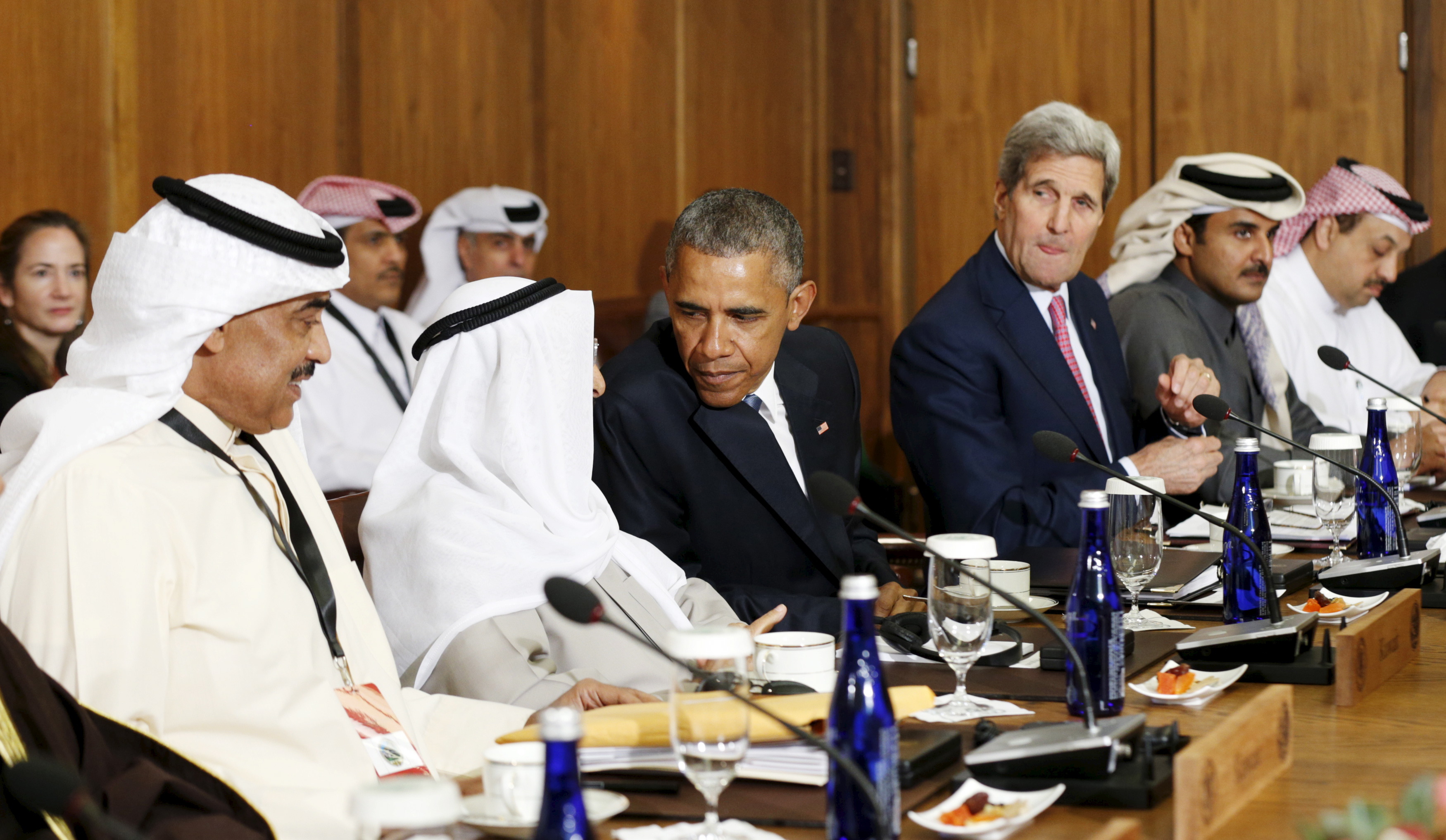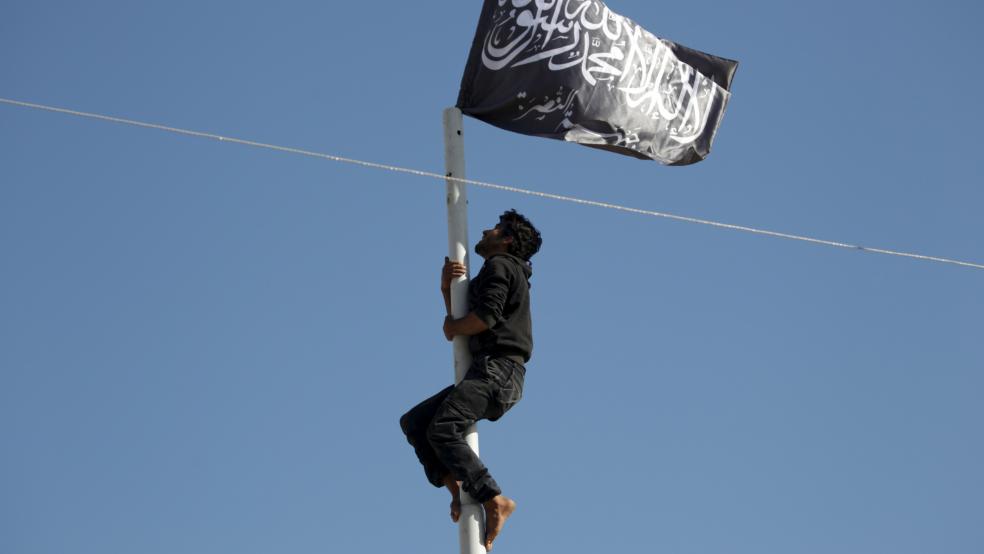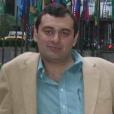Ask Americans to name the terror group they fear most, and they’ll probably says ISIS, even though it was al-Qaeda that killed more than 3,000 people on 9/11/2001. Compared to ISIS, al-Qaeda is seen as the “devil we know,” not the band of barbaric thugs who burn people alive, rape children, and destroy or pilfer historic artifacts for sale on the black market.
The rivalry between the two terror groups has even prompted the unthinkable—that the U.S. and al-Qaeda would somehow work together to defeat ISIS. Last August General David Petraeus, former CIA director and commander of U.S. forces in Iraq and Afghanistan, urged the Pentagon to consider empowering al-Qaeda’s al-Nusra Front in Syria to fight ISIS. Petraeus, like others, believe Nusra is “moderate” compared with the tactics of the Taliban or ISIS, and could be an asset. But aligning with the lesser of two evils of terrorism is a policy fraught with pitfalls.
Related: Reclaiming the Title ‘King of Jihad’ Means al-Qaeda Will Target the West
Al-Qaeda has been relatively quiet ever since Osama bin Laden was killed by U.S. Special Forces in 2011. But cutting off the head of the snake doesn’t mean it still can’t strike. Al-Qaeda is regrouping, reorganizing and replenishing their bank accounts in preparation for their next nefarious terrorist activities. As the mother organization that spawned ISIS, al-Qaeda, which has many branches, is now competing with its unruly progeny for recruits, money and leadership of the global jihadist crusade.
In the minds of many, al-Qaeda is still the mother ship, providing the rationale and incentive for jihad. One of al-Qaeda’s top lieutenants inspired the San Bernardino terrorists, despite their loyalty to ISIS, according to The Washington Post. Syed Farook and his neighbor, Enrique Marquez Jr. were radicalized by Anwar al-Awlaki who was born in the U.S. and killed four years ago by a CIA drone.
Today, Al-Qaeda is not working alone. It’s getting help from one of the United States’ Middle East allies—Qatar. A little noticed event highlights Qatar’s influence.
A prisoner swap between the Lebanese government and al-Qaeda's branch in Syria, Al-Nusra Front in early December showed how powerful the group has become on the ground. The deal released 16 Lebanese soldiers and police officers who were captured during a joint ISIS-al-Nusra operation along with 29 civilians, some of whom are known terrorists.
Related: Can the U.S. Use al-Qaeda Fighters to Defeat ISIS? David Petraeus Has a Plan
The heart of the agreement guarantees al-Nusra free reign inside what had been a safe haven in Lebanon’s Hamid valley, bordering Syria, with access to the Lebanese town of Arsal. After the deal was signed, TV footage broadcast by Al Jazeera Arabic showed an armed group of al-Qaeda fighters with the group's black banners cheering al-Qaeda’s victory. Lebanon’s Minister of Interior, Nouhad Machnouk, put it bluntly, saying Arsal is occupied by al-Nusra Front.
The official mediator in the Lebanese deal was the small Gulf country of Qatar, which hosts the advanced headquarters of the U.S. Central Command. Sources claim that Qatar paid al-Nusra $25 million and persuaded the terror group to accept the deal. The Qatari Ambassador to Lebanon denied paying the ransom, but it is not the first time a government paid al-Qaeda a ransom to release a hostage and then denied it. Qatar subscribes to the same ideology that Saudi Arabia, al-Qaeda and ISIS adhere to -- the extreme version of Islam called Wahhabism. Osama bin Laden and most of the 9/11 hijackers were Saudi nationals.
In a detailed paper on Qatar’s relations with terror, Denis MacEoin, a Distinguished Senior Fellow at the Gatestone Institute reveals that four branches of the Qatari government are in charge of relations with armed groups in Syria and Libya. These are the Foreign and Defense Ministries, the Intelligence Agency, and the office of the Emir. Large amounts of money are passed to intermediaries in Turkey, and this money is used for the purchase of weapons from other countries. The weapons are then transferred to rebel groups in Syria. “Qatar has also financed terrorists in northern Mali operations, including Ansar Dine, alleged to be linked to al-Qaeda in the Islamic Maghreb [North Africa], says MacEoin.
Qatar’s long history with terrorism funding starts from the very top: the royal family, according to the Foundation for Defense of Democracies. A friend of the royal family in Qatar, the 61-year-old hardline businessperson and professor Abd al-Rahman al-Nuaymi, was designated a global terrorist by the U.S. in December 2013. Nuaymi is a Qatari who lives and operates in Qatar. The U.S. Treasury Department placed sanctions on him and declared him a "Qatar-based terrorist financier and facilitator who has provided money and material support and conveyed communications to al-Qaeda and its affiliates in Syria, Iraq, Somalia and Yemen for more than a decade."
Related: Al-Qaeda-Affiliated Group Claims Mali Hotel Attack
Nuaymi was transferring $2 million a month to al-Qaeda in Iraq. He also sent roughly $576,000 to Abu Khalid al-Suri, al-Qaeda's Syrian representative, and $250,000 to the Somali jihadist group, al-Shabaab. He funded Asbat al-Ansar, a Lebanese terrorist group associated with al-Qaeda that was blacklisted in 2001. Nuaymi is still a free man in Qatar. “Doha refuses to arrest him, a choice that speaks volumes about its priorities on terror finance,” says David Andrew Weinberg, a Senior Fellow at the Foundation for Defense of Democracies.

President Obama hosts a working session of the six-nation Gulf Cooperation Council (GCC) at Camp David in Maryland May 14, 2015. Qatari Emir Sheikh Tamim bin Hamad Al Thani attended. REUTERS/Kevin Lamarque
In July 2008, Washington sanctioned Qatari national Khalifa Mohammed Turki Subaiy, a senior official of Qatar’s Central Bank, on terror finance charges. The Treasury Department said that Subaiy provided financial support to Khalid Sheikh Mohammed, the 9/11 mastermind and al-Qaeda’s senior leadership in Pakistan, served as a diplomatic and communications conduit for the group in the Middle East, and helped move new al-Qaeda recruits to South Asia.
The U.N. Security Council added Subaiy to its al-Qaeda blacklist in October 2008. This obligated member states to freeze his financial assets. But Subaiy found a way around the sanctions. Two Jordanians with Qatari ID cards worked with Subaiy in 2012 to transfer hundreds of thousands of dollars to al-Qaeda and its senior leaders in Pakistan. They were sanctioned by the U.S. two years later. Today, Subaiy and other econo-terrorists are living freely among the residents in Qatar who have not been prosecuted under Qatari law.
In testimony to the 9/11 Commission and Congress, Jamal al-Fadl, Osama bin Laden’s former business aid who defected to the United States in 1996, said that Bin Laden told him in 1993 that the Qatar Charitable Society (QCS), later called Qatar Charity, was one of Bin Laden’s major sources of funding.
Related: Al-Qaeda Claims French Attack, Derides Paris Rally
Fadl also said that QCS’s director at the time was a fellow member of al-Qaeda who provided travel documents and funds, including paying fighters in Eritrea and providing $20,000 for an attack out of Sudan. In 2008, an interagency U.S. task force described Qatar Charity as a “terrorism support entity.”
“Qatar Charity has acted as a financier and agency for terrorist outfits in several countries. It has funded al-Qaeda in Chechnya, Mali and elsewhere, was a key player in the 1998 bombings of U.S. embassies in Kenya and Tanzania, and funded Syria's Ahfad al-Rasul Brigade,” adds MacEoin.
Khalid Sheikh Mohammed and Ramzi Yousef
“Al-Qaeda operative Khalid Sheikh Mohammed (KSM) moved to Qatar in 1993 at the suggestion of its Minister of Islamic Affairs and Endowments, Abdullah bin Khalid bin Hamad Al Thani, a prominent member of the royal family and a first cousin of the emir. KSM wired money from Qatar to his nephew Ramzi Yousef to be used in the 1993 World Trade Center bombing. KSM also planned al-Qaeda’s 1994-95 “Operation Bojinka” to blow up airliners from the Philippines.
U.S. intelligence officials, including former counterterrorism czar Richard Clarke said that Al Thani was transferring both his personal money and ministry money to al-Qaeda and that he harbored other al-Qaeda leaders as they passed through Qatar, providing them with lodging, false documents, and other services.
The U.S. wanted Qatar’s permission to arrest KSM. When the U.S. was granted that permission in early 1996, he was no longer in the country. American intelligence officials believed that Al Thani had tipped off KSM. Al Thani was promoted to Minister of State for Internal Affairs that same year. In 2001, he was promoted again to Interior Minister and remained in that position until 2013.
Qatar Emir, Sheikh Tamim bin Hamad Al Thani was responsible for brokering the deal among Qatar, Saudi Arabia and Turkey last May to support the Syrian rebels and al-Nusra, who have been fighting both Assad in Syria and ISIS. The agreement took place on the eve of a meeting between Arab leaders and President Obama to discuss Syria and stability in the Middle East. At its worst, the deal reflects opposition by a strong Sunni coalition against Iran, Assad, and a potential Russian supported Shia alliance. At its best, the Qatar deal gives the U.S. a chance to reassess its failed support of the Syrian rebel fighters and redirect resources to a ground force that can win against ISIS.
Who that may be is still a question.





